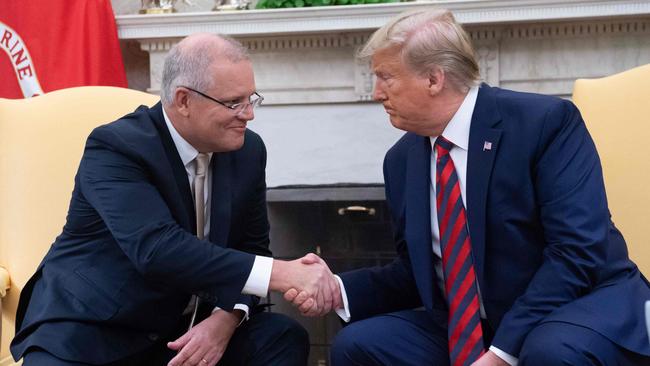Scott Morrison’s AUKUS warning a timely message on China
Scott Morrison’s warning that Labor must promote AUKUS as a military deterrent against Beijing,is a timely attempt at jolting Canberra into the risks of normalising ties with China.

Scott Morrison is warning Anthony Albanese that, unless he presents AUKUS as a strategic deterrent to China, he could run into trouble with Donald Trump.
This is an important message for the Albanese government as it pursues a stabilisation of relations with Beijing.
Donald Trump has assembled a national security team of China hawks, is threatening the CCP with tariffs of 60 per cent and will be attracted to AUKUS as a military check on Beijing in the Indo-Pacific.
Meanwhile, Australian policy with China is running in the opposite direction - towards normalisation.
As the architect of the landmark AUKUS agreement, Morrison is trying to jolt Canberra into realisation of the risks.
Most important, the normalisation of ties with Beijing must not cloud Australian perceptions about the purpose of AUKUS.
The security agreement was always directed at China and deterring Beijing militarily. Morrison says it should be promoted as such and not as a jobs program.
Any Australian reluctance about the purpose of AUKUS will create friction with the new administration.
Morrison’s comments are grounded in the notion that a key foundation for AUKUS is that Australia and the US share a deep strategic alignment in the Indo-Pacific.
He is warning Australia against being lulled into thinking China has changed its long-term strategic objectives.
In this, he is on a unity ticket with Australia’s ambassador in Washington, Kevin Rudd, who says in his most recent book that Beijing has only changed its tactical diplomacy.
While it wielded the stick during the Morrison era, Beijing has opted for the carrot in dealing with Albanese.
Morrison says the goal is the same - to drive a wedge between Canberra and Washington and isolate the US.
This point is also made by another former prime minister, Tony Abbott, who was more definitive in pressing home the choice for Australia.
Abbott says Canberra can no longer be “even handed between the United States and China” and accuses Labor of putting short term economic interests ahead of the long term national interest.
The comments from both prime ministers point to a world that may be greatly changed in the next four years, placing even greater pressure on the model once articulated by John Howard -
that Australia does not have to choose between Beijing and Washington.




To join the conversation, please log in. Don't have an account? Register
Join the conversation, you are commenting as Logout